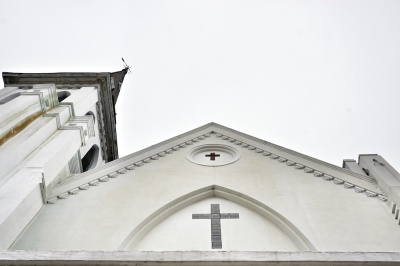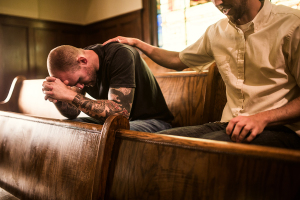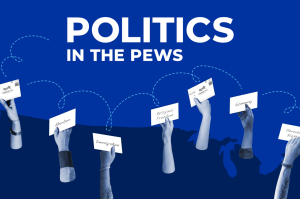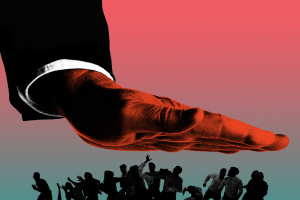Polyamory, Africa and Methodism

Recently a United Methodist minister anonymously posted an article in a Pittsburgh newspaper identifying himself and his wife as actively polyamorous but regretting they must operate secretly without church affirmation. He hoped for a day, as a pastor, when he might openly have multiple sexual partners of both sexes.
That day may not be too far off. The 2019 United Methodist General Conference reaffirmed traditional sexual teachings. But 40% of delegates voted for the “simple plan” to delete all sexual restrictions from the denominational law book. With many traditional congregations now exiting the denomination, it’s almost certain that some version of the “simple plan” eventually will prevail. The polyamorous pastor and his wife can then operate openly.
Meanwhile, there was a recent statement from the United Methodist bishops in Africa affirming their plans to remain United Methodist and disavowing any advocacy for following many U.S. traditionalists who are exiting. The statement was widely circulated by USA church liberals as proof that Africa will remain United Methodist even after denominational liberalization. The Africa statement listed names of bishops who were “present” without specifically asserting they voted for the statement. Several bishops reportedly spoke against the statement. One Nigerian bishop told United Methodist News Service that he was not present and opposed the statement.
The Africa Initiative, a group of African laity and clergy advocating for traditional beliefs, was specifically targeted by the bishops, and responded here. Having successfully worked with USA traditionalists to uphold traditional sexual standards, mostly recently at the 2019 General Conference, the Africa Initiative says it will stay United Methodist through the 2024 General Conference. But it will not remain in a denomination that liberalizes. The U.S.-based Wesleyan Covenant Association, which partners with the Africa Initiative, also responded to the bishops.
United Methodist bishops in Africa must navigate carefully. Few of them are themselves liberal. But their salaries and much of their program funding comes from the U.S. They perceive themselves as reliant on liberal USA bishops and church structures. Before the 2019 General Conference, apparently several of them assured liberal USA bishops that their delegates would support the defeated “one church plan” at the 2019 General Conference that would have allowed the U.S. church to sexually liberalize. But Africa voted nearly unanimously against that plan, evincing either that bishops could not speak for their people, or that the bishops were disingenuous in their assurances.
United Methodists in Africa are overwhelmingly traditionalist and evangelistic, far more so than even conservatives in the U.S. church. They have close to zero tolerance for sexual or theological liberalization. Whatever the preferences of some of their bishops, it’s unlikely they would remain in a liberalized United Methodist Church. USA liberals of course hope that under a “one church plan” the USA church could liberalize while allowing other regions to operate under their own rules. So, the USA church would have same-sex rites and clergy actively sexual outside of traditional marriage, perhaps including polyamory. But Africa, with the churches in the Philippines and Europe, could contrive their own rules.
Why do USA liberals want Africa to remain United Methodist if the Africans profoundly oppose the liberals’ chief ecclesial agenda of full sexual liberalization? Maybe it’s mostly for optics. Maybe USA liberals want to boast they are part of an international church, parts of which are growing. But they do not explain why they wish to remain coalesced with churches they find profoundly unjust, discriminatory, and even bigoted. It’s not uncommon that USA liberals denounce African delegates at General Conference as hateful in their disapproval of non-traditional sexuality.
USA liberals, accustomed to their dominance in the USA church, maybe have not fully absorbed that Africa is now the majority in United Methodism. According to 2020 statistics, Africa has 7 million members, or 53% of total membership, versus 6.2 million in the U.S., which was losing 200,000 annually, while Africa was gaining twice that number annually. After the impact of the pandemic, and with hundreds of thousands of USA conservatives leaving United Methodism, it’s likely that United Methodism will soon be 60% or even 70% African.
Presumably, USA liberals assume that Africa, even as the growing and eventually overwhelming majority, will continue to accept subordinate status, leaving USA liberals largely in control. This may assume too much. It’s true that delegate allocations for General Conference do not fully recognize Africa’s strength. So, the 2024 General Conference may only be about 40% African, even though Africa is 53% and climbing. The Philippines and Europe together have 8% of delegates, meaning the U.S. church barely has a majority. Possibly USA liberals will have a bare majority at the 2024 General Conference to sexually liberalize. But the 2028 General Conference may be more difficult and unwieldy.
United Methodists in Africa, bishops, clergy, and laity have long wanted to keep United Methodism together and retain traditional sexual teachings. Unlike in the U.S., official church rules on sexuality are officially upheld in Africa. But many clergy and lay leaders in Africa, many of them General Conference delegates, have reluctantly come to accept that church institutional cohesion is no longer possible as USA church leadership refuses to uphold church law. Bishops in Africa, at least publicly, are not accepting that reality and for now are largely insisting on a United Methodist future.
The future for United Methodism is not easily predictable. But it is fairly certain that very few of the 7 million United Methodists in Africa ultimately will remain in a church with heterodox and sexually liberal teachings, much less Pittsburgh polyamory. And the growing African majority likely will not long endure rule by USA liberals who are now a fast-shrinking minority.
Originally published at Juicy Ecumenism.
Mark Tooley became president of the Institute on Religion and Democracy (IRD) in 2009. He joined IRD in 1994 to found its United Methodist committee (UMAction). He is also editor of IRD’s foreign policy and national security journal, Providence.



























